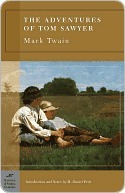More on this book
Community
Kindle Notes & Highlights
Tom gave up the brush with reluctance in his face, but alacrity in his heart. And while the late steamer Big Missouri worked and sweated in the sun, the retired artist sat on a barrel in the shade close by, dangled his legs, munched his apple, and planned the slaughter of more innocents.
Tom said to himself that it was not such a hollow world after all. He had discovered a great law of human action, without knowing it—namely, that in order to make a man or a boy covet a thing, it is only necessary to make the thing difficult to attain. If he had been a great and wise philosopher, like the writer of this book, he would now have comprehended that Work consists of whatever a body is obliged to do and that Play consists of whatever a body is not obliged to do.
Well, go 'long and play; but mind you get back sometime in a week, or I'll tan you.”
Often, the less there is to justify a traditional custom the harder it is to get rid of it.
MONDAY MORNING found Tom Sawyer miserable. Monday morning always found him so—because it began another week's slow suffering in school. He generally began that day with wishing he had had no intervening holiday, it made the going into captivity and fetters again so much more odious.
Huckleberry came and went, at his own free will. He slept on doorsteps in fine weather and in empty hogsheads in wet; he did not have to go to school or to church, or call any being master or obey anybody; he could go fishing or swimming when and where he chose, and stay as long as it suited him; nobody forbade him to fight; he could sit up as late as he pleased; he was always the first boy that went barefoot in the spring and the last to resume leather in the fall; he never had to wash, nor put on clean clothes; he could swear wonderfully. In a word, everything that goes to make life precious
...more
TOM'S MIND was made up now. He was gloomy and desperate. He was a forsaken, friendless boy, he said; nobody loved him; when they found out what they had driven him to, perhaps they would be sorry; he had tried to do right and get along, but they would not let him; since nothing would do them but to be rid of him, let it be so; and let them blame him for the consequences—why shouldn't they? What right had the friendless to complain? Yes, they had forced him to it at last: he would lead a life of crime. There was no choice.
For a little while, hope made a show of reviving—not with any reason to back it, but only because it is its nature to revive when the spring has not been taken out of it by age and familiarity with failure.


